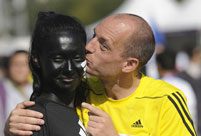JOHANNESBURG, Oct. 31 -- South Africa will have an opportunity to see the upcoming solar eclipse, an expert said on Thursday.
The words were spoken by the director of the Johannesburg Planetarium at Wits University Claire Flanagan as addressing the solar eclipse expected on Sunday.
On Thursday, the International Astronomical Union announced in a statement that a rare solar eclipse will sweep across parts of Africa, Europe and the U.S.on Nov. 3.
Flanagan said that some countries near the equator will have an opportunity to view a total solar eclipse as the moving moon is directly between the sun and our earth, including some central African countries like the Democratic Republic of Congo, Uganda and Kenya.
Positioning around the Southern Tropic, South Africa will catch the partial eclipse if weather is permitted.
"Further south or north of the equator the line-up is not perfect, resulting in a partial eclipse," said the director.
The administrative capital of Pretoria in the northern part of South Africa will see 6 percent of the solar eclipse, while the port city of Durban in the southern part of the country will only view 0.4 percent of the eclipse.
Regions further southwards like Cape Town will see no eclipse. "There is a total eclipse on our earth once a year or two, but each eclipse is only seen from less than 1 percent of the earth," said the expert.
In 2002, the northeastern province of Limpopo in South Africa was lucky to see a total solar eclipse.
However, the next time for South Africa to witness the solar eclipse will be in 2030, said the expert.
The expert suggested viewers should not look directly at the sun during unusual hybrid eclipse unless taking special precautions, such as using the special welder's glass or viewing it indirectly with a pinhole filter.
 Annual airshow kicks off in Houston
Annual airshow kicks off in Houston U.S. Navy Carrier Strike Group stages military exercises
U.S. Navy Carrier Strike Group stages military exercises Volkswagen showcases new energy vehicles in Beijing
Volkswagen showcases new energy vehicles in Beijing  Different eye catching shows at housing fairs in China
Different eye catching shows at housing fairs in China Special family portraits call attention to left-behind children
Special family portraits call attention to left-behind children Migrant children’s pain and joy in city
Migrant children’s pain and joy in city Lingerie show dazzles Wuhan Motor Show 2013
Lingerie show dazzles Wuhan Motor Show 2013  Running in fun customs at Beijing Int'l Marathon
Running in fun customs at Beijing Int'l Marathon  Weekly Sports Photos
Weekly Sports Photos Unveil PLA air force base
Unveil PLA air force base  World has never been dark-- a blind kid’s life in Tibet
World has never been dark-- a blind kid’s life in Tibet Oriental education or western education?
Oriental education or western education? China in autumn: Kingdom of red and golden
China in autumn: Kingdom of red and golden National Geographic Traveler Photo Contest
National Geographic Traveler Photo Contest Chinese screen goddesses from Beijing Film Academy
Chinese screen goddesses from Beijing Film Academy Day|Week|Month